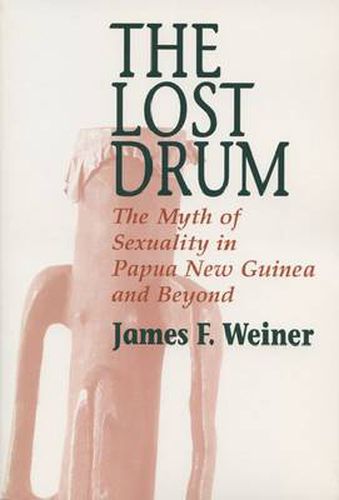Readings Newsletter
Become a Readings Member to make your shopping experience even easier.
Sign in or sign up for free!
You’re not far away from qualifying for FREE standard shipping within Australia
You’ve qualified for FREE standard shipping within Australia
The cart is loading…






The Lost Drum is both a theoretical experiment in anthropology and a provocative analysis of myth and ritual in Papua New Guinea societies. James F. Weiner offers the first comprehensive attempt to fashion an anthropological method from the psychoanalytic theories of Jacques Lacan and extends his own previous work on Melanesian sociality and language.
Applying literary, psychoanalytic, and hermeneutic theories to myths of the Foi, Marind-anim, Yafar, and Gimi peoples, Weiner shows how mythic narratives reveal the productive and consumptive processes that compose the New Guinea person and body. He uncovers a discourse on sexuality, consumption, voice, and subjectivity that both challenges the neo-Freudian paradigm that has dominated psychological anthropology and disputes the reciprocity and exchange models of social integration that have characterized descriptions of Melanesian society.
Expanding upon Roy Wagner’s theory of symbolic obviation, Weiner argues against constructionist readings of text: myth does not represent social reality but only models a specific way of making it visible. In The Lost Drum, he traces the route of certain objects–the string bag, the drum, the bullroarer, the flute-as their meanings unfold in the mythical narratives of Papua New Guinea. In so doing, he illuminates the instability of social and sexual identities in Melanesia.
$9.00 standard shipping within Australia
FREE standard shipping within Australia for orders over $100.00
Express & International shipping calculated at checkout
The Lost Drum is both a theoretical experiment in anthropology and a provocative analysis of myth and ritual in Papua New Guinea societies. James F. Weiner offers the first comprehensive attempt to fashion an anthropological method from the psychoanalytic theories of Jacques Lacan and extends his own previous work on Melanesian sociality and language.
Applying literary, psychoanalytic, and hermeneutic theories to myths of the Foi, Marind-anim, Yafar, and Gimi peoples, Weiner shows how mythic narratives reveal the productive and consumptive processes that compose the New Guinea person and body. He uncovers a discourse on sexuality, consumption, voice, and subjectivity that both challenges the neo-Freudian paradigm that has dominated psychological anthropology and disputes the reciprocity and exchange models of social integration that have characterized descriptions of Melanesian society.
Expanding upon Roy Wagner’s theory of symbolic obviation, Weiner argues against constructionist readings of text: myth does not represent social reality but only models a specific way of making it visible. In The Lost Drum, he traces the route of certain objects–the string bag, the drum, the bullroarer, the flute-as their meanings unfold in the mythical narratives of Papua New Guinea. In so doing, he illuminates the instability of social and sexual identities in Melanesia.